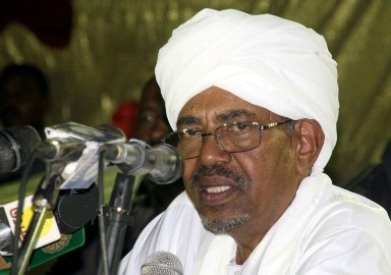Sudan’s Bashir takes part in African Union meeting on Libyan crisis
November 8, 2016 (KHARTOUM) – Sudan’s President Omer Hassan al-Bashir travelled on Tuesday to the Ethiopian capital, Addis Ababa where seven African leaders meet at the African Union headquarter to launch a new initiative to solve the 5-year-old Libyan crisis.

Al-Bashir was accompanied by a high level delegation including Foreign Affairs Minister Ibrahim Ghandour, Minister of Presidential Affairs Fadl Abdallah Fadl, Director of the National Intelligence and Security (NISS) Gen. Mohamed Atta, and Director of the Presidential office General Taha Osman.
According to the official Sudan News Agency (SUNA), the delegation was received by the AU Commissioner for Peace and Security Ismael Sharfi and the chief of protocol at the Ethiopian foreign ministry.
For his part, Sudanese Ministry Foreign Affairs spokesperson, Ambassador Garib Allah Khidir said that the meeting is held at AU headquarters with the participation of the leader of Egypt, Tunisia, Algeria, Niger and Chad, as well as representatives of the five regions of Africa.
In the light of the report which is presented by the AU Commissioner for Peace and Security, the meeting would seek the appropriate ways to strengthen the ongoing efforts to restore stability and security to Libya.
In her speech to the meeting African Union chairperson, Nkosazana Dlamini-Zuma, said that 2.4 million Libyans are in need of humanitarian assistance. She added that inter-factional fighting forced some 350,000 people to flee their areas.
“The economic situation in Libya is equally dire with destruction of infrastructure leading to a dangerously low oil production. This situation cannot continue,” Zuma said.
(ST)
